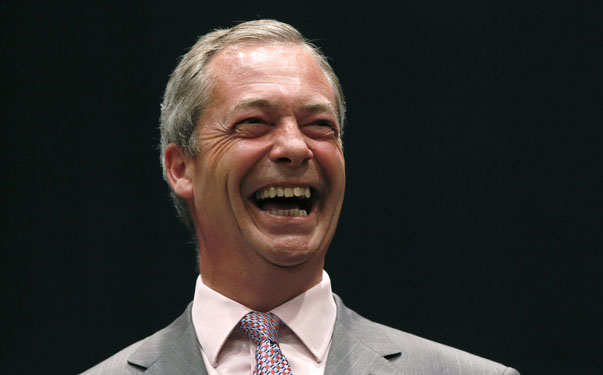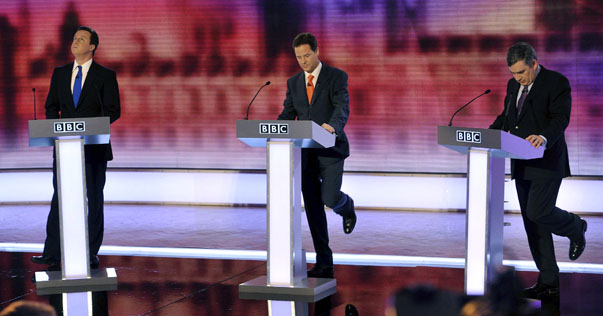Ukip could get significantly more airtime in the run-up to the general election after the broadcasting regulator Ofcom said it was minded to class it as a “major party” for the first time.
At the moment only the Conservatives, Labour and the Lib Dems are classed as UK-wide “major parties” by Ofcom, which means broadcasters are bound to give them “due weight” during election periods.
Now Ofcom says it may add Ukip to the list, while the Green Party is likely to miss out. Is that fair?
The analysis
What does today’s news mean?
This isn’t a done deal – there will be a month-long consultation before Ofcom makes a final decision in early March on whether to add to the list of “major parties”.
At the moment, the parties on the list are: the Tories, Labour and Lib Dems in Great Britain; the SNP in Scotland; Plaid Cymru in Wales; the Alliance, the DUP, Sinn Fein, the SDLP and the Ulster Unionists in Northern Ireland.
But the regulator says its “inital view” is that Ukip “may qualify” as a major party, while the Greens and Northern Irish party Traditional Unionist Vote probably won’t, thanks to relative levels of public support.
Last year Ofcom did class Ukip as a major party in England and Wales ahead of the European Parliamentary Elections, based on its growing popularity in various previous elections and in opinion polls.
So all the signs are that Ukip will get major party status before this year’s general election, guaranteeing it a lot more TV and radio coverage.
Major parties must be offered at least two party election broadcasts on Channel 3 services (ITV, STV and UTV), Channel 4, Channel 5 and the radio stations Classic FM, Talksport and Absolute.
“Due weight” does not mean broadcasters have to give equal airtime to the major parties across its news coverage, and it doesn’t mean smaller parties get completely ignored.
In fact, Ofcom rules say: “Smaller parties and independent candidates may also be among those with significant views and perspectives, to which appropriate coverage may need to be given.”
But editors will be obliged to give more prominence to Ukip than in any previous poll.
It’s difficult, for example, to imagine that no major broadcaster will give Nigel Farage a place in a party leaders’ debate if there are four official main parties.
Measuring support
Ofcom use opinion polls and previous election reports to find out whether a party attracts enough support to be granted “major” status.
Not unreasonably, they conclude that Ukip “has not demonstrated significant past electoral support in previous general elections… performance in a number of other significant forms of election has, however, been stronger”.
It’s true that across all kinds of election – local, European and general – Ukip has generally increased its share of the vote in recent years, while support for the Green Party has remained low.
Here’s what happened in the last few European Parliamentary elections…
http://static.data.c4news.com/nnuD4/index.html
The complication here is that if you look at the European election votes cast in Scotland alone, it’s a different story. Now the Greens were more popular than Ukip until last year:
http://static.data.c4news.com/Ngz9L/index.html
That’s why the Greens argued in submissions to Ofcom last year that Ukip should not be granted major party status for the 2014 Euro elections.
In the end Ofcom said Ukip should only be treated as a major party in England and Wales only, so stations in Scotland would not have to air messages from Nigel Farage to a potentially less receptive electorate north of the border.
Our understanding is that the regulator might put a similar arrangement in place for the general election.
Here’s how Ukip and the Greens fared in recent English council elections:
http://static.data.c4news.com/JTxFE/index.html
General elections are trickier to put in context. These are the raw percentages:
http://static.data.c4news.com/oiGqt/index.html
But of course this doesn’t tell us the whole story. Note that the Green Party got one MP elected in 2010 and Ukip failed to win any seats even though its share of the vote was much higher than the Greens’.
This isn’t particularly surprising. It’s a quirk of our first-past-the-post system that votes spread out over a bigger geographical area tend not to translate into actual parliamentary seats being one.
The Green vote nationally is low but a lot of their support is centred around Brighton, where Caroline Lucas was elected MP at the last election.
Ukip has of course managed to get two MPs elected since 2010 following by-elections in Clacton and in Rochester and Strood.
Opinion polls
Ofcom has also noted that Ukip have been Britain’s third most popular party for a while in the polls.
The latest BBC poll of polls – which averages the results from all the big political research companies – puts Labour on 34 per cent, the Conservatives on 32, Ukip in third place on 14 per cent and the Lib Dems in fourth on 9 per cent.
This is not a recent blip. Ukip have been consistently polling ahead of Clegg and Co since the beginning of last year.
The Greens might feel a bit hard done by here – if they are indeed not listed as a major party.
After all, like Ukip, they have regularly outscored the Lib Dems in polls of voter intentions. In the latest three YouGov polls this month, the Lib Dems were on 7 per cent and the Greens were neck-and-neck on 7 or slightly ahead on 8 per cent.
Party membership
Ofcom don’t look at this – but it’s another metric we can throw in.
The House of Commons Library puts the latest estimates as: Conservatives 134,000; Labour 190,000; SNP 92,000 Lib Dems 44,000; Ukip 39,000; Greens 29,000.
Some of these number are out of date and some are claims that cannot be independently verified.
The researchers note that there is a long-term decline in membership for the Tories, Lib Dems and Labour, while the SNP, Ukip and the Greens have seen their ranks swell significantly since 2010.
The verdict
There can’t be any real dispute that support for Ukip in all kinds of elections has risen dramatically in recent years, while the Green share of the vote has remained fairly static.
But Green party membership is significant and rising, and opinion polls regularly show the Greens edging ahead of the Lib Dems.
Ukip has been consistently beating the Lib Dems into fourth place in the polls for about a year now.
Support for Ukip is not consistent across the UK though. In Scotland the party has failed to make much of an impact in elections or polls. We understand that Ofcom may reflect this by designating Ukip a “major party” in England and Wales only.
Comparing Ukip to the Greens also shows how a party can get a much bigger share of the national vote than a rivals but fail to win as many seats.
That’s what happened to Ukip in 2010 and it could happen to them again next year. The party could even get a bigger percentage of the national vote than the Lib Dems but emerge with very few MPs to show for it.
There’s one more thing worth noting. Ukip supporters who post in the comments section of this blog often suggest that there is a conspiracy among “mainstream media” organisations to deny them the coverage they deserve.
But in the previous Ofcom consultation on last year’s Euro elections, Channel 4, Channel 5, ITV and STV said they thought Ukip should be awarded “major party” status for UK-wide broadcasts.





